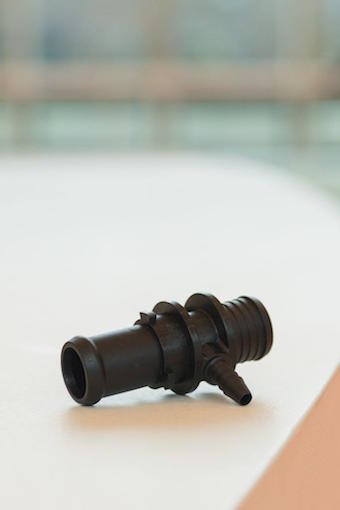DSM debuts high hydrolysis resistance polyamide 410 - Arhive
DSM debuts high hydrolysis resistance polyamide 410 and 4T materials for automotive cooling systems
Engineering plastics supplier DSM is extending its portfolio of high performance materials for automotive applications requiring hydrolysis resistance across a wide range of temperatures.
The portfolio is targeted at water-cooling related applications under the hood. The company is also announcing a new application for a hydrolysis-resistant grade of its high performance EcoPaXX bio-based polyamide.

“T” connector for a coolant hose is molded from polyamide 410; withstands high internal pressures at temperatures of up to 135°C.
DSM’s extensive portfolio of materials based on polyamides 410 and 4T (EcoPaXX and ForTii, respectively) are all inherently resistant to hydrolysis.
One particular grade, EcoPaXX Q-HG6/7, is very well suited for applications such as expansion tanks that need to resist coolants at high temperatures.
It enables part weight to be cut by as much as 30% compared with polyamide 66.
A recently-developed thin-walled “T” connector for a coolant hose in this grade has just been approved for use by a major German car manufacturer, and is scheduled to go into commercial production in the next few months.
The connector needs to withstand high internal pressures at temperatures of up to 135°C—something that is not possible with PA66.
“EcoPaXX offers strength and reliability even in critical areas like the weld lines in complex designs ,”says Thomas Selberdinger, Sales Manager Automotive, at DSM.
For applications where even higher temperature resistance is required, DSM points to grades of ForTii. These have similar thermal properties as other polyphthalamides (PPAs), but with superior processability.
Now, DSM is adding to its range of high performance materials with compounds based on Xytron polyphenylene sulfide (PPS), which is also an inherently hydrolysis resistant polymer; these are intended for applications where very high dimensional stability is part of the requirements.
In addition, DSM is introducing a new grade of Akulon polyamide 66 that has very good resistance to water/glycol mixtures used at elevated temperatures in automotive cooling systems.
“With the addition of all these new compounds, DSM now has a product pallet that covers just about every application where hydrolysis resistance is needed, whatever the operating temperature,”says Selberdinger.
“We are well known for our strength in high-heat polyamides, but a PA66 grade with very good hydrolysis resistance was something that we lacked.
On top of that, our new Xytron PPS compounds will help us to enter even more demanding applications where extreme stability is called for.”
The new Akulon PA66 is available in two versions: HR-HG6 and HR-HG7, containing 30% and 35% glass fiber reinforcement, respectively.
Both have shown good resistance to an aqueous solution of ethylene glycol under accelerated tests. They comply with OEM requirements to retain a high degree of flexural strength after immersion in the solution for 1000 hours at 135°C.
Applications targeted by the new Akulon grades include expansion tanks, air intake manifolds and oil pans with integrated cooling channels, and oil filter/cooler modules.
Further, DSM is currently carrying out final tests on newly developed Xytron PPS compounds in water/glycol solutions.
“First results indicate very promising performance in this field, and also with regard to heat and chemical resistance,”Selberdinger says.
DSM will be offering PPS compound formulations with both glass fiber reinforcement and mineral filler to provide the required characteristics for automotive components, not only in cooling systems, but also ignition, lighting, fuel, drive, and control systems.
PPS has sufficient heat resistance for use in components operating in environments with temperatures constantly.
